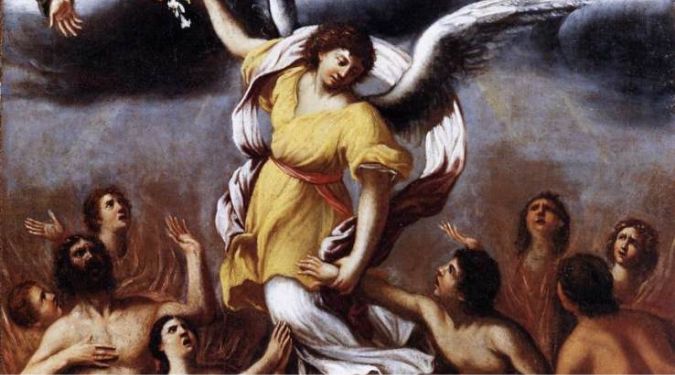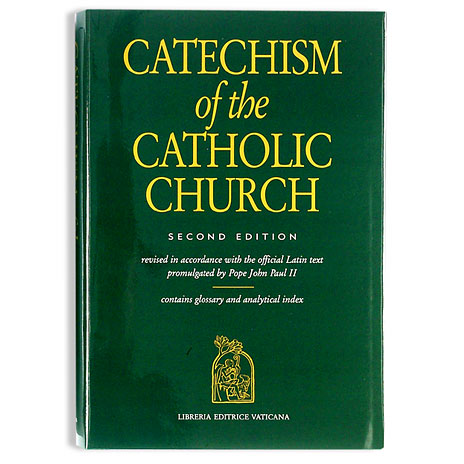Purgatory is perhaps one of the more misunderstood doctrines by Non-Catholics and Catholics alike. Three common objections are raised by our Protestant brethren against this doctrine. First, they regard that by believing in Purgatory, Catholics reject the sufficiency of Jesus’ sacrifice. Second, Purgatory appears to be a “second chance” for those who did not choose Jesus while on earth. And third, the word Purgatory is no where to be found in the Bible. In this article we will address each of these objections, presenting biblical evidence as well as examining the Catechism of the Catholic Church.
Isn’t Jesus’ Sacrifice Sufficient?
Contrary to Protestants’ mistaken understanding of what Catholics believe, we are actually in agreement that Jesus’ sacrifice is indeed sufficient for us to merit heaven. The Catechism states in paragraph 1992, “Justification has been merited for us by the Passion of Christ who offered Himself on the cross as a living victim, holy and pleasing to God, and whose blood has become the instrument of atonement for the sins of all men.” It seems that our separated brethren forget that while our justification and redemption were merited by Jesus’ sacrifice, our sanctification and purification are ongoing processes which continue until we die (and even beyond our earthly lives if we need to be purified before entering Heaven.)
Scripture states in Revelation 21:27, “But nothing unclean shall enter it [Heaven].” Hebrews 12:14 echoes the same theme of the need to be sinless in order to enter Heaven: “Strive for peace with all men, and for the holiness without which no one will see the Lord.”
Is Purgatory a “Second Chance?”
To understand Purgatory, it is essential to know the difference between guilt and reparation and mortal and venial sins. By comprehending this, it will be clear that Purgatory is not a “second chance” for Heaven for those who rejected Jesus while on earth. When sin has been committed, guilt can be forgiven but reparation certainly has to be made for the wrongdoing. Reparation is something done to make up for the wrong. For example, if a person crashes into your car, you may forgive him of his guilt but you certainly will demand that he pay for the damages. Scripture has the best example of this in 2 Samuel 12: 13-14. Here King David committed adultery and also murdered Bathsheba’s husband, Uriah. David asked for forgiveness and the prophet Nathan answered him, “The Lord also has put away your sin, you shall not die. Nevertheless, because by this deed you have utterly scorned the Lord, the child that is born to you shall die.” His guilt was forgiven but reparation was demanded. Our separated brethren have an incomplete understanding of this. They have a mistaken notion that both guilt and reparation are forgiven by God once a person is truly sorry for their sins.
The distinction between sins that cause death (mortal sins) and sins which wound the soul (venial sins) must be clear in order to understand Purgatory. Scripture differentiates between these sins in l John 5:16-17. James 1:14-15 also talks about sin which starts off as temptation then matures only to “bring forth death.”
According to the Catechism, “All who die in God’s grace, but still imperfectly purified, are indeed assured of their eternal salvation; but after death they undergo purification, so as to achieve the holiness necessary to enter the joy of heaven.” (CCC 1030) We are commanded by Jesus in Matthew 5:48 to “be perfect, as your heavenly Father is perfect.” Those who die without perfect holiness but in a state of grace will undergo purification in Purgatory. Hence, Purgatory is not a “second chance.” It is for the saved that need to be made clean before entering Heaven. All souls in Purgatory eventually enter Heaven.
Where is “Purgatory” in the Bible?
The third objection, “it’s not in the Bible,” can be easily refuted. While it is not explicitly spelled out and mentioned by name, the reality of Purgatory is found throughout Scripture. The name is not what is important. What is important is the doctrine itself. The words “Trinity” or “Incarnation” are not mentioned specifically in the Bible either, yet they are central to the Christian faith. By the way, the word “Purgatory” comes from the Latin, “purgatorium” (to purge).
The most definitive evidence of the reality of Purgatory is found in 2 Macabees 12:44-46. In this passage Judas Macabee and his men had found, in the bodies of their fallen comrades, “tokens of the idols of Jamnia, which the Law forbids the Jews to wear.” As a result, “they turned to prayer, beseeching that the sin which has been committed might be wholly blotted out…for if he were not expecting that those who had fallen would rise again, it would have been superfluous and foolish to pray for the dead…Therefore he made atonement for the dead, that they might be delivered from their sin.” This passage shows the practice and attitude of the Jews before the time of Jesus. They PRAYED for their dead and still do today.
Other evidence from Scripture can be found in 1 Corinthians 3: 11-15. Here Paul refers to a foundation, Jesus, on which one builds with “gold, silver, precious stones, wood, hay, or straw… If the work which any man has built on the foundation survives, he will receive a reward. If any man’s work is burned up, he will suffer loss, though he himself will be saved, but only as through fire.” In this passage, if this loss meant hell, then how can the person still be saved? This certainly is not hell, nor can it be Heaven since there is no suffering of loss. This refers to the fires of Purgatory which cleanses and purifies the saved.
Purgatory is described as a prison in Matthew 5:26 where “You will never get out till you have paid the last penny.” In hell there is nothing to be paid back. You are in there forever. Surely this passage, as well as the passage from 1 Peter 3:19 where Jesus “preached to the spirits in prison” do not refer to hell. Jesus has nothing to say to the eternally damned in hell.
In conclusion, we have shown that Purgatory is indeed scriptural. It shows the depth of God’s love and mercy for us. God, who is a consuming fire, draws us closer to Him, burning our sinfulness away. This entails suffering and pain so as to wipe out every vestige of our selfish desires. We must, by accepting the finished work of Jesus, cooperate with the Holy Spirit in our sanctification so we may “inherit the kingdom prepared for us from the foundation of the world.” (Matthew 25:34)




Many thanks for this article Aggie. As a former protestant these were things with which I struggled before my conversion to the Faith but was unable (until now) to even articulate to myself let alone to others. Thank you.